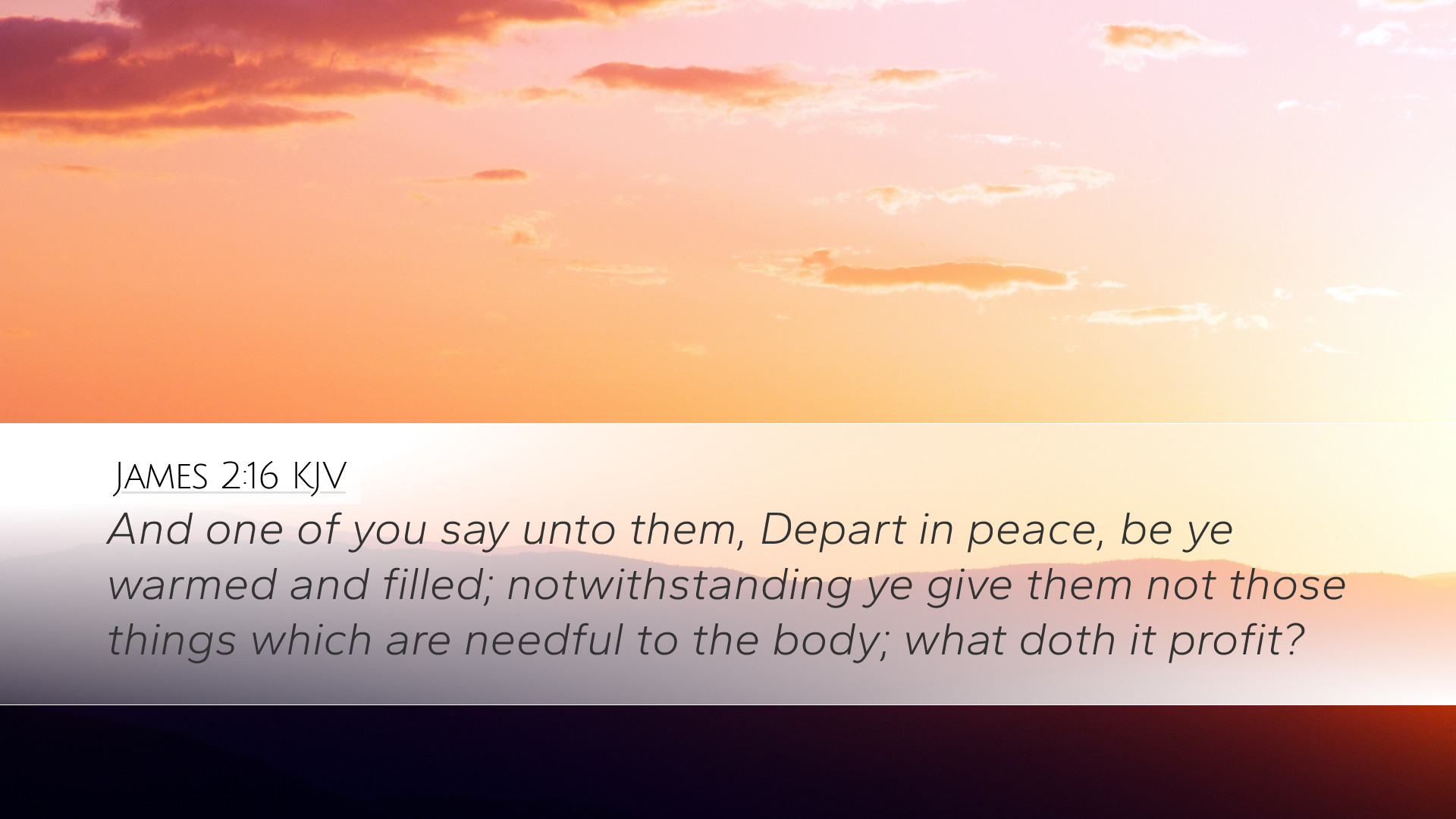Old Testament
Genesis Exodus Leviticus Numbers Deuteronomy Joshua Judges Ruth 1 Samuel 2 Samuel 1 Kings 2 Kings 1 Chronicles 2 Chronicles Ezra Nehemiah Esther Job Psalms Proverbs Ecclesiastes Song of Solomon Isaiah Jeremiah Lamentations Ezekiel Daniel Hosea Joel Amos Obadiah Jonah Micah Nahum Habakkuk Zephaniah Haggai Zechariah MalachiJames 2:16
James 2:16 KJV
And one of you say unto them, Depart in peace, be ye warmed and filled; notwithstanding ye give them not those things which are needful to the body; what doth it profit?
James 2:16 Bible Commentary
Commentary on James 2:16
James 2:16 states: "And one of you say unto them, Depart in peace, be ye warmed and filled; notwithstanding ye give them not those things which are needful to the body; what doth it profit?" This passage encapsulates the essence of practical faith and active love, which is a recurring theme in the epistle of James. The Apostle emphasizes that faith must be reflected in action—specifically, in how we respond to the needs of others.
Introduction
The book of James has often been referred to as the "Proverbs of the New Testament." It emphasizes the importance of ethical living in the Christian life. In this particular verse, James critiques a superficial faith that lacks both compassion and practical response to human suffering.
Contextual Background
Before delving deeper into the verse, it is important to understand the context in which James writes. His audience consisted of early Christians who were facing trials and temptations. James addresses their need to demonstrate their faith through good works. In this light, the specific admonition concerning the poor is a call to see faith as an active, living reality that involves caring for others.
Verse Analysis
-
Superficial Generosity:
The phrase "Depart in peace" indicates a superficial and insincere response; it is a common pleasantry that lacks substance. Matthew Henry notes that simply wishing someone well without providing assistance is reminiscent of a hollow piety. This reflects an attitude that is easy to adopt, especially in a society desensitized to poverty as the early Christians were.
-
Conditional Kindness:
James critiques those who offer words of comfort rather than tangible help. Albert Barnes emphasizes that “warmth and filling” symbolize the most basic human needs—food and shelter. The critique is not only against neglecting to help but also against the emptiness of platitudes without follow-through.
-
Profitable Faith:
The question "what doth it profit?" challenges readers to consider the value of a faith that does not manifest in acts of kindness. Adam Clarke elaborates on this by connecting faith to the fruits of the Spirit, suggesting that true faith should naturally lead to love and action. Without this, faith remains unfruitful, similar to a tree that does not bear fruit.
Theological Implications
This verse presents several theological implications regarding faith and works in the Christian life.
- Faith in Action: The integration of faith and action is crucial in the Christian walk. James illustrates that faith without works is dead (James 2:26). Thus, not only must one believe in Christ, but one must also express that belief through love and deeds.
- The Role of Compassion: Compassion is a manifestation of genuine faith. Those who profess faith are called to embody Christ's love in tangible ways, especially towards the marginalized and needy. In this light, societal status does not exempt one from the Christian duty to care for others.
- Critique of Hypocrisy: James confronts hypocrisy, showing that empty words are insufficient. The challenge for believers is to examine their own attitudes toward social needs and their response to those who suffer.
Practical Application
James 2:16 is profoundly relevant in contemporary society, where the gap between rich and poor continues to widen.
- Call to Action: Pastors and church leaders are encouraged to mobilize their congregations into action. This involves creating ministries that address the needs of the poor and ensure that help is rendered efficiently and respectfully.
- Individual Responsibility: On a personal level, believers are challenged to evaluate their daily interactions. Do their words reflect genuine concern, or are they merely societal conventions? Engaging with those in need should be seen not as a burden but as a privilege borne out of love.
- Building Communities of Faith: The church should reflect a community where needs are known and addressed, fostering an identity rooted in service and mutual care. By doing so, the church serves as a beacon of hope and love in a fractured world.
Conclusion
In conclusion, James 2:16 serves as a profound reminder that faith devoid of works is ineffectual. The challenge laid before us is simple yet profound: to allow our faith to be expressed through our actions—especially in how we respond to those who suffer from poverty and need. As we continue to reflect on this passage, let us commit ourselves to a faith that is alive, active, and overflowing with love for our neighbors.


